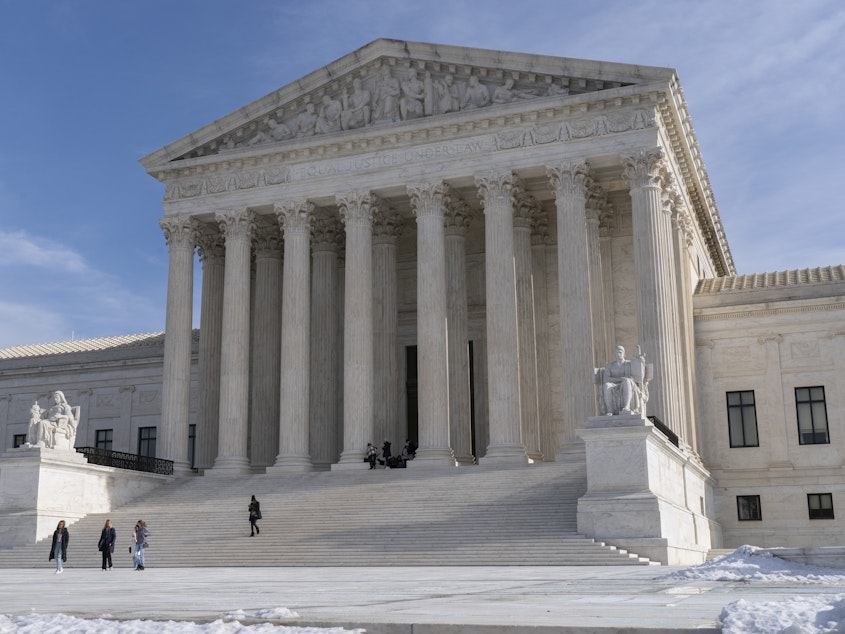Supreme Court hears arguments on campaign finance law, issues statement on NPR report

Three Supreme Court justices issued statements Wednesday addressing an NPR story about relations among the justices. On Tuesday, NPR reported that Justice Sonia Sotomayor, a longtime diabetic, had indicated to Chief Justice John Roberts that because of the omicron surge, she did not feel safe being in a room with people who are unmasked, and that the chief justice "in some form asked the other justices to mask up."
On Wednesday, Sotomayor and Gorsuch issued a statement saying that she did not ask him to wear a mask. NPR's report did not say that she did. Then, the chief justice issued a statement saying he "did not request Justice Gorsuch or any other justice to wear a mask on the bench." The NPR report said the chief justice's ask to the justices had come "in some form."
NPR stands by its reporting.
What is incontrovertible is that all the justices have at once started wearing masks — except Gorsuch. Meanwhile, Sotomayor has stayed out of the courtroom. Instead, she has participated remotely in the court's arguments and the justices' weekly conference, where they discuss the cases and vote on them.
That pattern continued Wednesday as the court heard arguments in a campaign finance case brought by Sen. Ted Cruz, R-Texas.
At issue was a provision of the 2002 Bipartisan Campaign Reform Act, which bars election winners from raising more than $250,000 after an election to repay loans the candidate has made to their own campaign.
Cruz has stipulated that he deliberately set up the facts of this case in order to test the provision. The day before the general election, he lent his campaign $260,000 — $10,000 more than the law allows him to be reimbursed with post-election contributions. At the time, he had more than $2.4 million in campaign cash on hand that he could have used to pay off the loan.
Instead, he filed suit, charging that the $250,000 cap on using post-election donations for loan repayment is unconstitutional. Cruz argues that the limit burdens his First Amendment free speech rights because it restricts his ability to be reimbursed after the election. The Federal Election Commission counters that money given after an election has a potentially corrupt purpose.
The argument fell along predictably ideological lines, with the court's six conservatives signaling support for Cruz and the three liberals indicating that they would defer to Congress' judgment — namely that using post-election contributions to pay off a debt could lead to quid pro quo corruption.
As Justice Elena Kagan put it, if a contributor wants to help out with a loan repayment, "One day I had a $10,000 loan. I'm $10,000 richer. Somebody just made me a $10,000 gift."
Justice Amy Coney Barrett, however, saw things differently. "This doesn't enrich him personally because he's no better off than he was before," she said. "It's paying a loan, not lining his pockets."
Justice Brett Kavanaugh suggested the limit would chill Cruz's speech. As he put it, "The choice is to spend that without any possibility of getting it back or not spend it at all."
Representing Cruz, lawyer Charles Cooper contended that Congress didn't see post-election contributions as necessarily corrupt. There are "reasons enough for a contributor to come after an election and make a contribution to the winner," he contended.
"You've just said the magic words," interjected Sotomayor. "To make a contribution to the winner — not to the campaign, but for the pockets of the winner — that's a very different corrupting influence."
However the Cruz case comes out, it didn't sound as though the court would use it as a vehicle to invalidate the entire Bipartisan Campaign Reform Act, or what remains of it. Senate Republican leader Mitch McConnell, a longtime opponent of campaign finance regulation, filed a brief in the case asking the court to strike down the whole law, including campaign contribution limits. He said the act is a "constitutional train wreck." [Copyright 2022 NPR]



